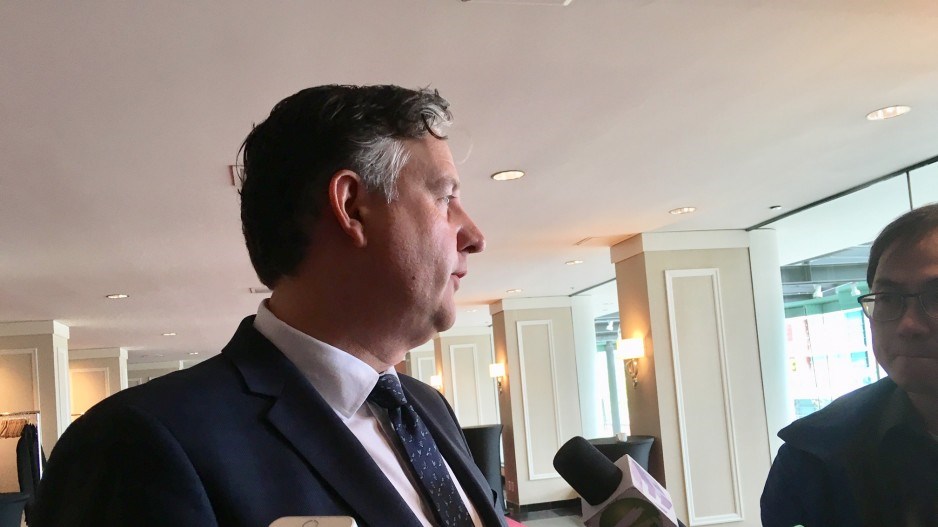From driverless cars to ride-hailing spars, the mayors of Vancouver and Surrey appear to be on the same page for a host of transportation issues.
The mayors were making an appearance at the Greater Vancouver Board of Trade on Tuesday (April 16) to promote their joint Smart Cities pilot, which is competing for a $50-million prize from Ottawa.
“We’ve shown the rest of Canada how two distinct cities can work together,” Surrey Mayor Doug McCallum told the GVBOT audience.
Next month the federal government announces the winning bids for Canada’s Smart Cities Challenge, a global initiative pushing cities to use electronic data collected from Internet of Things (IoT) sensors to more efficiently manage their services.
The City of Vancouver and the City of Surrey are among five finalists. And they have spent about two years collaborating on a joint bid to create two collision-free, multi-modal corridors — one each within their own respective borders.
The corridors would feature autonomous vehicles, IoT sensors, and advanced data and analytics to create a zone that reduces transportation safety risks, greenhouse gas emissions and boosts transportation efficiency.
It’s attracted more than $36 million in investments from private enterprise and the cities have together invested another $15 million, according to Surrey director of information technology Sean Simpson who, along with City of Vancouver chief technology officer Jessie Adcock, provided the GVBOT audience with an update on the joint pilot before the mayors took the stage.
“This [pilot] kind of allows us to identify those problems earlier and find a way that we can co-ordinate on a regional level because you can imagine if we have autonomous vehicles going across city borders and one city is kind of all hooked up and the other isn’t,” Vancouver Mayor Kennedy Stewart told the crowd.
“This early work can help us identify all the issues we’re going to have to think about in the future.”
Stewart recalled a recent meeting with billionaire Jimmy Pattison and former B.C. premier Glen Clark, who serves as president of Pattison’s group of companies, in which they told him the advent of autonomous vehicles “was going to go like a hockey stick” in terms of adoption rates.
“That’s why we have to do this kind of work, to get ready,” Stewart said.
In August 2018 Transportation Canada committed $386,000 to the City of Vancouver’s driverless infrastructure and pilot deployment planning project for autonomous and Internet-connected vehicles.
Ottawa said the project would study how connected and self-driving cars can integrate into a future transportation network.
During their respective 2018 mayoral campaigns both Stewart and McCallum pushed hard for SkyTrain extensions within their own cities.
TransLink has pegged the SkyTrain extension costs at $2.6 billion for Surrey, and between $3.3 billion and $3.8 billion for an extension from Vancouver to the University of B.C.
When asked by Business in Vancouver after the event if the costs of extending SkyTrain were congruent with the ability of driverless cars to reduce traffic in the near future, Stewart said autonomous vehicles were still far down the road.
“Although we have a couple of awesome autonomous vehicles — one in Surrey, one in Vancouver — and we’re piloting them, I mean this is so far away at this point from being an everyday use item within our region that public transit is an absolutely essential investment,” he said.
“Public transit is always going to be important and I’m so glad to support Surrey’s efforts to get the SkyTrain extended to Langley, and very grateful that Doug McCallum from Surrey is supporting my efforts to get SkyTrain extended to UBC.”
Meanwhile, both Stewart and McCallum indicated that their cities would continue pursuing the Smart Cities initiative even if they did not walk away with the $50-million prize from Ottawa.
“You’ve always got to commit to smarter cities. It’s not like we can commit to dumber cities,” Stewart said, drawing laughs from the crowd.
And as to whether the long-awaited introduction of ride-hailing services could play a part in the Smart Cities initiative, Stewart and McCallum both said during the panel that that issue rests with the provincial government.




